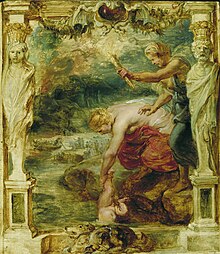Achilles' heel
This article is about the phrase. For other uses, see Achilles Heel (disambiguation).
An Achilles' heel is a weakness in spite of overall strength, which can actually or potentially lead to downfall. While the mythological origin refers to a physical vulnerability, idiomatic references to other attributes or qualities that can lead to downfall are common.
Origin
In Greek mythology, when Achilles was a baby, it was foretold that he would die young. To prevent his death, his mother Thetis took Achilles to the River Styx, which was supposed to offer powers of invulnerability, and dipped his body into the water. But as Thetis held Achilles by the heel, his heel was not washed over by the water of the magical river. Achilles grew up to be a man of war who survived many great battles. But one day, a poisonous arrow shot at him was lodged in his heel, killing him shortly afterwards.
The death of Achilles was not mentioned in Homer's Iliad, but appeared in later Greek and Roman poetry and drama[1] concerning events after the Iliad, later in the Trojan War. In the myths surrounding the war, Achilles was said to have died from a heel wound which was the result of an arrow—possibly poisoned—shot by Paris.[2]
Classical myths attribute Achilles's invulnerability to his mother Thetis having treated him with ambrosia and burned away his mortality in the hearth fire except on the heel, by which she held him. Peleus, his father, discovered the treatment and was alarmed to see Thetis holding the baby in the flames, which offended her and made her leave the treatment incomplete.[3] According to a myth arising later, his mother had dipped the infant Achilles in the river Styx, holding onto him by his heel, and he became invulnerable where the waters touched him—that is, everywhere except the areas of his heel that were covered by her thumb and forefinger.[4]
The use of “Achilles heel” as an expression meaning “area of weakness, vulnerable spot” dates only to 1840, with implied use in Samuel Taylor Coleridge's "Ireland, that vulnerable heel of the British Achilles!" from 1810 (Oxford English Dictionary).


